USEFUL ORGANIZATIONS, BOOKS and WEB links: Whether you are already deeply engaged or just learning about our climate, environmental and social challenges and how we might address them, here are some resources we hope you will find of interest here to support and inspired you on your journey. Suggestions for additions are always welcome.
Some Websites of interest:
Resilience.org – insight and inspiration for turbulent times – about building community resilience in a 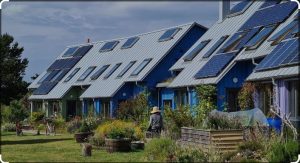 world of multiple emerging challenges: the need to stop burning fossil fuels and both conserve energy and build renewable energy at speed, conserving and protecting water in a time of depletion, addressing complex interlinked environmental crises like climate change and biodiversity loss, and the social and economic issues which are linked to these.
world of multiple emerging challenges: the need to stop burning fossil fuels and both conserve energy and build renewable energy at speed, conserving and protecting water in a time of depletion, addressing complex interlinked environmental crises like climate change and biodiversity loss, and the social and economic issues which are linked to these.
The Post Carbon Institute – their mission is to lead the transition to a more resilient, equitable, and sustainable world by providing individuals and communities with the resources needed to understand and respond to the interrelated ecological, economic, energy, and equity crises of the 21st century from the following perspectives:  The Big Picture
The Big Picture
Limits to Growth (it’s not just about technology)
http://www.postcarbon.org/report/1882095-climate-after-growth
Post Peak Living: http://www.postpeakliving.com/
The Resilience Alliance – on social-ecological systems for resilient and sustainable futures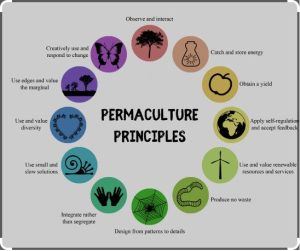
Permaculture Principles for sustainable agriculture from Permaculture BC
Cowichan Green Community cultivates resilient, inclusive, secure and healthy local food systems within their mission of cultivating food, community, and resilience in the Cowichan Valley. This means growing food, supporting others to grow food in community gardens, advocating for sustainable food policy, and promoting the role of ecological agriculture in the local community.
The New Economics Foundation – UK organization working with people igniting change from below combined with rigorous research to fight for change at the top for a healthy environment & equitable future.
The Transition Network http://www.transitionstreets.org.uk/ http://transitionculture.org/
Some Books on Climate Challenges & Solutions Worth Reading (can be ordered through local bookstores; also available as e-books) 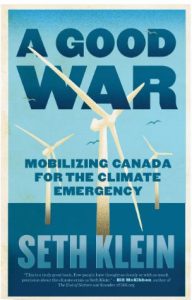
A Good War: Mobilizing Canada for the Climate Emergency (2020) by Seth Klein
Saving Us: A Climate Scientist’s Case for Hope and Healing in a Divided World (2021) by Katherine Hayhoe
All We Can Save: Truth, Courage and Solutions for the Climate Crisis (2021) edited by A.E. Johnson & K.K. Wilkinson
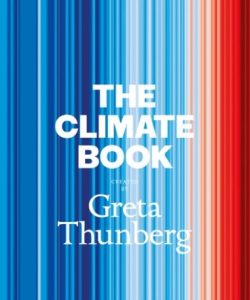 The Climate Book (2023) – Greta Thunberg has gathered wisdom from over 100 experts around the globe to equip us with the knowledge we need. Alongside them she shares her own stories, inspiring us to act together.
The Climate Book (2023) – Greta Thunberg has gathered wisdom from over 100 experts around the globe to equip us with the knowledge we need. Alongside them she shares her own stories, inspiring us to act together.
From What Is to What If: Unleashing the Power of Imagination to Create the Future We Want (2019) by Rob Hopkins
Doughnut Economics: Seven Ways to Think Like a 21st-Century Economist (2018) by Kate Raworth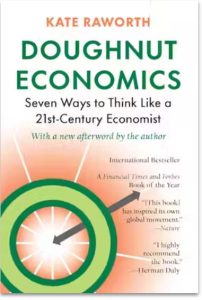
Less is More: How Degrowth will Save the World (2020) by Jason Hickel
This Changes Everything: Capitalism vs The Climate (book 2014, documentary 2015, ongoing project) by Naomi Klein
Urgent Message from a Hot Planet: Navigating the Climate Crisis (2022 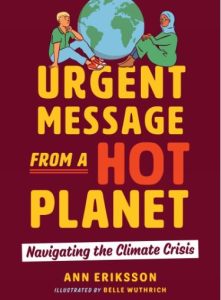 understanding climate science & how to take action for young people) by Ann Eriksson (local author)
understanding climate science & how to take action for young people) by Ann Eriksson (local author)
REDUCING YOUR OWN CARBON FOOTPRINT both personally, at home and in your neighborhood: If you are interested in reducing your carbon footprint, you can make a huge difference by getting your home off fossil fuels, and there are heat pump rebate programs to help you get there. Check out other cost saving home retrofitting programs here. And here’s another resource for reducing your household energy and water use and the associated costs: Transition Streets Handbook will guide you as a household, or your whole block if you want to have fun doing it as a five week neighbourhood challenge or support project. This guidebook was used by the families and individuals from five households that participated in North Cowichan’s 2014 Climate Household Challenge with the support of Transition Cowichan mentors. The Handbook can be found at this link. You’ll need to scroll down to find the link to the various chapters.
